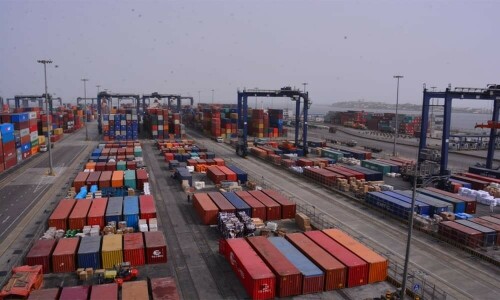Transporters’ Strike Disrupts Cargo Movement at Karachi Ports
The Transporters of Goods Association (TGA) has escalated its strike action at Karachi ports, resulting in a complete standstill of import and export cargo transportation between factories and seaports nationwide.
The strike has now entered its fourth day, which began on Friday, raising significant concerns about the spoilage of perishable goods and the accumulation of demurrages, which are levied in US dollars on held cargoes.
Jawed Bilwani, President of the Karachi Chamber of Commerce and Industry (KCCI), stated that the ongoing transporters’ strike is expected to worsen the challenges in boosting Pakistan’s exports.
“Global trade tensions already exist due to tariffs, and this strike could further hinder our export targets,” he commented, urging relevant authorities to address the situation promptly to resolve the strike and restore normal business operations.
According to a source at the Karachi Port Trust (KPT), the transporters initiated the strike because of disagreements with the Sindh government regarding vehicle fitness standards.
The KPT source clarified that the port authorities are not involved in the dispute that led to the strike.
The transporters are requesting a six-month period to address concerns related to fitness certificates, heavy vehicle repairs, and the mandatory installation of cameras in their vehicles.
Khurram Ijaz, former vice president of the Federation of Pakistan Chamber of Commerce and Industry (FPCCI), mentioned that cargo movements at Karachi ports were partially disrupted during the initial two days (Tuesday and Wednesday).
Ijaz added, “However, on Thursday, they [transporters] completely halted cargo movement by securing support from other transport associations.”
He cautioned that if the situation persists without authorities intervening to bring transporters to the negotiation table, cargo ships may soon depart from the ports without any cargo.
Ijaz warned that this situation would also impede operations at factories and negatively impact the country’s import and export activities within a few days.
“The country is already struggling to enhance exports and stimulate economic growth,” he noted.
Approximately 10,000 containers are typically transported daily within Karachi and across the nation.
FPCCI Vice President Asif Sakhi also stated that approximately 90% of import and export activities have been suspended because of the strike.
“Ships anchored offshore might be unable to dock due to congestion at the ports, leading to disruptions in import and export orders,” Sakhi explained. “Thousands of containers are stranded due to the transporters’ protest, causing significant congestion at the terminals.”
According to TGA President Tariq Gujar, approximately 10,000 containers are moved daily within Karachi and to other parts of the country.
In a written statement, the TGA demanded a six-month timeframe to address vehicle-related issues, including installing cameras, releasing impounded vehicles, and ceasing the cancellation of vehicle registrations.



Comments (0)
No comments yet. Be the first to comment!
Leave a Comment